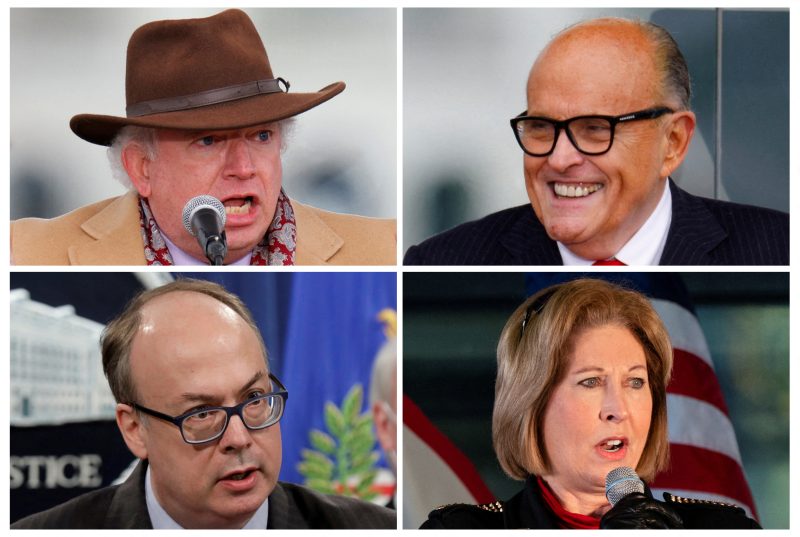Whenever former president Donald Trump’s Jan. 6, 2021, indictment case goes to trial, you’re bound to hear a lot about his lawyers. Five Trump-aligned lawyers are listed among six unnamed co-conspirators.
Those lawyers are also set to figure prominently in a key defense Trump will apparently offer: that he was relying on “advice of counsel” in his brazen efforts to overturn the election. How could it be corrupt if the nonlawyer president was told all this was kosher by the actual lawyers?
But some key former Trump allies are stepping forward to call that into question. And the indictment also takes care to undermine this defense before it’s ever offered.
Former attorney general William P. Barr and a former top aide to former vice president Mike Pence both offered a contrasting spin on the “advice of counsel” defense Wednesday. They suggested that it wasn’t that Trump was a victim of his lawyers, but rather that he sought out lawyers who would tell him what he wanted to hear and assist in his plot.
“I think he had some crazy-ass lawyers around him, but I think there’s no doubt he sought them out,” former Pence aide Marc Short said on MSNBC.
Barr was also asked about whether the “advice of counsel” defense might work, and he built upon Short’s point.
“I don’t think that dog is going to hunt,” Barr said on CNN.
“He wouldn’t listen to all the lawyers in the [Justice] Department who — in various departments or the White House that had those responsibilities, or his campaign,” Barr said. “He would search for a lawyer who would give him the advice he wanted.”
This is a defense that the indictment also rather clearly anticipates.
While laying out his case against Trump, special counsel Jack Smith focuses the internal debate over the claims of two alleged co-conspirators whose identities match Trump lawyers Sidney Powell and John Eastman.
The indictment introduces “Co-Conspirator 3,” a lawyer appearing to describe Sidney Powell, as someone Trump “privately acknowledged to others sounded ‘crazy.’”
The indictment later returns to this point, noting that Trump promoted one of Powell’s lawsuits despite having derided her as “crazy.”
This scene is key. While it’s not clear what specific testimony or evidence it references, Trump spokeswoman Hope Hicks testified to the House committee investigating the Capitol riot about such a scene during a November 2020 phone call involving Trump and Powell.
This is a long excerpt from her testimony, but it’s worth digesting, given that it will surely come up in this context (key parts bolded):
The specific timing of this scene isn’t clear. But the indictment says Trump nonetheless went on to promote Co-Conspirator 3’s Nov. 25, 2020, lawsuit in Georgia. (Powell’s Nov. 25 Georgia lawsuit did indeed mention Venezuela and Iran.)
The implication would clearly seem to be that Trump was using Powell to further theories about which he was, at the very least, skeptical.
Barr in his CNN interview also pointed to another way in which the indictment appears geared toward undermining the “advice of counsel” defense.
“I’m not even sure you would characterize what Eastman said as ‘advice,’” Barr said. He added that “some of what he was saying essentially was, ‘Well, you know, it’s unclear here, and you can make this argument. I’m not saying the courts would accept it,’ and so forth. And you act on that, it’s your own hazard.”
The indictment indeed notes that, despite a Dec. 23, 2020, memo from “Co-Conspirator 2” (Eastman) outlining a plan to have Pence help overturn the election on Jan. 6, Co-Conspirator 2 had just two months earlier “taken the opposite position.”
The indictment also cites a key Jan. 4, 2021, meeting involving Trump and Pence, in which two Eastman theories were floated. One was that Pence could unilaterally reject electors for Joe Biden in key states. The other was that Pence could delay things by asking states to determine whether Biden’s electors or the alternate Trump electors were legitimate.
The indictment says Pence pushed back on the idea that he could even send the issue back to the states, and Co-Conspirator 2 acknowledged, “Well, nobody’s tested it before.”
“Did you hear that?” Pence said to Trump, according to the indictment. “Even your own counsel is not saying I have that authority.”
Trump allegedly responded: “That’s okay, I prefer the other suggestion.”
To be clear, Trump was allegedly referring to the more drastic idea. So the indictment is saying he effectively shrugged off Eastman’s advice that the less drastic idea might not work and said he preferred the more extreme one.
The indictment says a senior adviser that same day informed Trump that Co-Conspirator 2 had conceded that his plan was “not going to work.”
Which brings us to the final key scene. After all of the above, the indictment says Trump the next day — on Jan. 5 — directed top Pence aides to meet with Co-Conspirator 2 (again, apparently Eastman).
“Co-Conspirator 2 now advocated that the Vice President do what the Defendant had said he preferred the day before: unilaterally reject electors from the targeted states,” the indictment says.
It adds that Co-Conspirator 2 advocated this despite acknowledging that he understood the plot would be unanimously rejected by the Supreme Court, if it ever got to that point.
In other words, the indictment is making the case that Eastman was pushing what Trump wanted him to, despite suggesting it wouldn’t work and even that it would obviously fail at the Supreme Court. And he did so more strongly after Trump made clear that this was his preferred path.






























